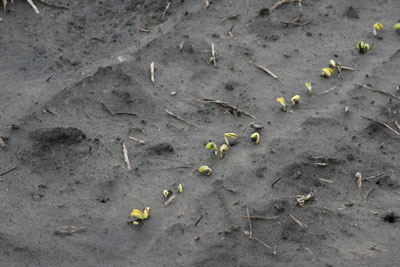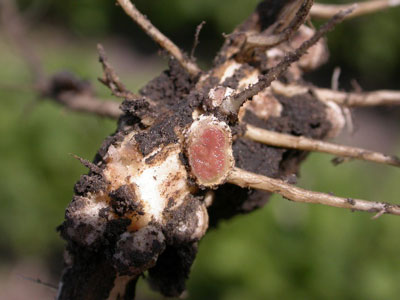
• When the expanding soybean hypocotyl lifts the cotyledons above the soil surface, sunlight causes the cotyledons to turn green and triggers growth of the unifoliate leaves, also stopping hypocotyl expansion.
• Cotyledons normally feed the developing plant for only about a week after emergence, but may do so longer under stress conditions. The cotyledons provide both stored nutrients and limited photosynthetic nutrients.
• Loss of terminal buds or leaves while cotyledons are still attached will trigger development of new axillary buds at the junctions (axils) of the cotyledons and stem.
• Soybean leaf tissue is much more cold tolerant than corn leaf tissue. Since the soybean growing point is always above ground after emergence, however, soybeans may suffer more from a late cold snap.

• The nitrogen-fixing root nodules on soybean roots normally begin to form within a week after plant emergence. The nitrogen-fixing bacteria will supply most of the young plant’s nitrogen requirements 10 to 14 days after formation. This process is inhibited in soils that are either too cool or too hot. The presence of soil nitrogen will also inhibit nodule formation.
• Nitrogen fixing root nodules last about 6 to 7 weeks each, but new ones continue to be formed through pod fill. Active nodules are a salmon color in the middle. These nodules tend to become inactive or die during hot, stressful periods of the summer and become olive colored in the middle.
• If weather or pests causes destruction of the terminal bud of the soybean plant, buds in the lower leaf axils may reconfigure to become new stem branches. Leaf axils over the entire height of the plant are also the sites from which flowers will arise.
• Soybeans have three growth habits: Determinate (vegetative growth stops when flowering is initiated), Indeterminate (vegetative growth continues long after flowering begins), and Semi-Determinate (vegetative growth continues after flowering begins, but stops earlier than with indeterminate varieties). Determinate varieties are more popular in the south because they remain shorter and resist lodging. Indeterminate and semi-determinate varieties are more popular in central and northern areas but some indeterminate varieties are now adapted and becoming more popular in the south, as well.
• Indeterminate soybean varieties may bloom over a period of several weeks, while determinate varieties may have all flowers open in just a few days.
• Flowering in soybeans is triggered by daily hours of darkness. Since nights (at the time of the summer solstice) actually are longer as you go south, moving a variety south from its adapted zone may cause it to bloom earlier. This is why we recommend staying close to adapted maturities, even with late planting or double-crop soybean production. In many cases, with late planting recommendations, a slightly fuller season variety is suggested.
• Narrow row spacing is preferable for late-planted or replanted soybeans. The closer proximity of these shorter plants in narrow rows allows for better utilization of sunlight.
• A period of stress may cause flowering of indeterminate and semi-determinate soybean varieties to slow or stop. On occasion, we have seen these soybeans renew both vegetative and reproductive growth with the return of favorable conditions. Although this demonstrates the adaptability of some of our modern varieties, the presence of both dry beans and “butter beans” on the same plant makes for difficult harvest and lower grain quality.
• Some soybean varieties are known to produce enough flowers to theoretically produce 250-bushel yields. While this unrealized yield potential is often a concern of soybean breeders, most recognize that this is simply a useful trait that helps the soybean tolerate periods of stress while maintaining a base reproductive potential.